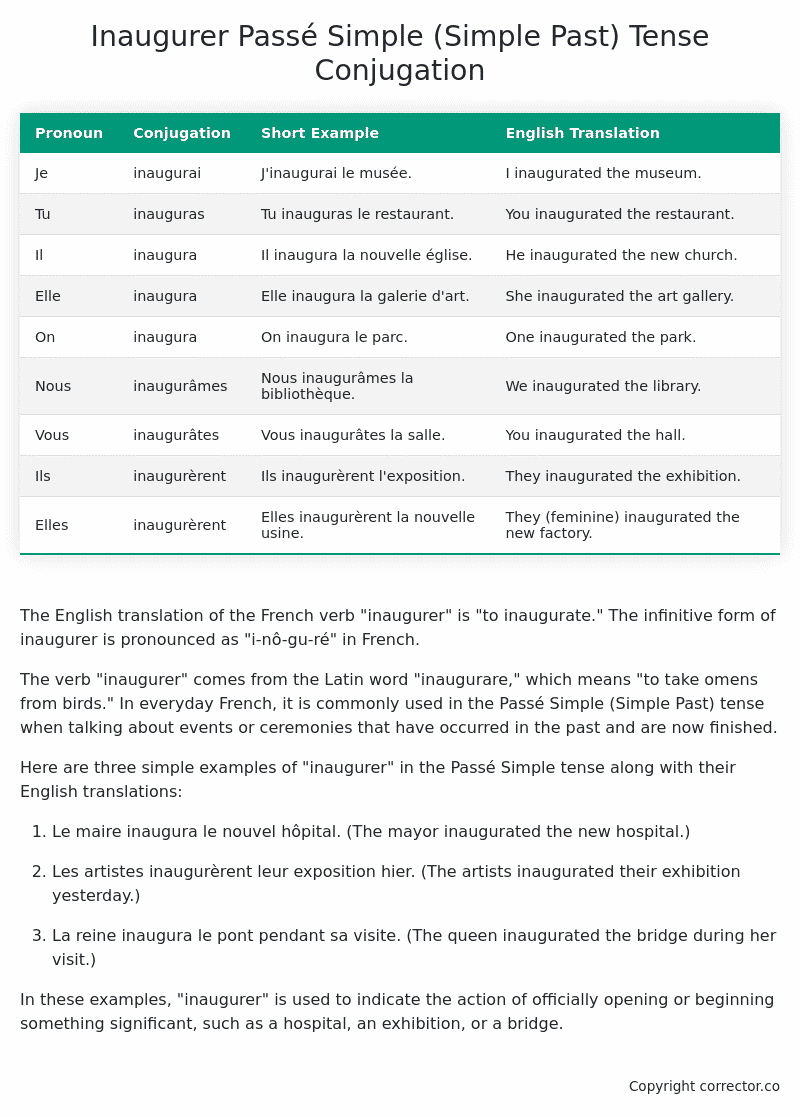Passé Simple (Simple Past) Tense Conjugation of the French Verb inaugurer
Introduction to the verb inaugurer
The English translation of the French verb “inaugurer” is “to inaugurate.” The infinitive form of inaugurer is pronounced as “i-nô-gu-ré” in French.
The verb “inaugurer” comes from the Latin word “inaugurare,” which means “to take omens from birds.” In everyday French, it is commonly used in the Passé Simple (Simple Past) tense when talking about events or ceremonies that have occurred in the past and are now finished.
Here are three simple examples of “inaugurer” in the Passé Simple tense along with their English translations:
-
Le maire inaugura le nouvel hôpital.
(The mayor inaugurated the new hospital.) -
Les artistes inaugurèrent leur exposition hier.
(The artists inaugurated their exhibition yesterday.) -
La reine inaugura le pont pendant sa visite.
(The queen inaugurated the bridge during her visit.)
In these examples, “inaugurer” is used to indicate the action of officially opening or beginning something significant, such as a hospital, an exhibition, or a bridge.
Table of the Passé Simple (Simple Past) Tense Conjugation of inaugurer
| Pronoun | Conjugation | Short Example | English Translation |
|---|---|---|---|
| Je | inaugurai | J’inaugurai le musée. | I inaugurated the museum. |
| Tu | inauguras | Tu inauguras le restaurant. | You inaugurated the restaurant. |
| Il | inaugura | Il inaugura la nouvelle église. | He inaugurated the new church. |
| Elle | inaugura | Elle inaugura la galerie d’art. | She inaugurated the art gallery. |
| On | inaugura | On inaugura le parc. | One inaugurated the park. |
| Nous | inaugurâmes | Nous inaugurâmes la bibliothèque. | We inaugurated the library. |
| Vous | inaugurâtes | Vous inaugurâtes la salle. | You inaugurated the hall. |
| Ils | inaugurèrent | Ils inaugurèrent l’exposition. | They inaugurated the exhibition. |
| Elles | inaugurèrent | Elles inaugurèrent la nouvelle usine. | They (feminine) inaugurated the new factory. |
Other Conjugations for Inaugurer.
Le Present (Present Tense) Conjugation of the French Verb inaugurer
Imparfait (Imperfect) Tense Conjugation of the French Verb inaugurer
Passé Simple (Simple Past) Tense Conjugation of the French Verb inaugurer (You’re reading it right now!)
Passé Composé (Present Perfect) Tense Conjugation of the French Verb inaugurer
Futur Simple (Simple Future) Tense Conjugation of the French Verb inaugurer
Futur Proche (Near Future) Tense Conjugation of the French Verb inaugurer
Plus-que-parfait (Pluperfect) Tense Conjugation of the French Verb inaugurer
Passé Antérieur (Past Anterior) Tense Conjugation of the French Verb inaugurer
Futur Antérieur (Future Anterior) Tense Conjugation of the French Verb inaugurer
Subjonctif Présent (Subjunctive Present) Tense Conjugation of the French Verb inaugurer
Subjonctif Passé (Subjunctive Past) Tense Conjugation of the French Verb inaugurer
Subjonctif Imparfait (Subjunctive Imperfect) Tense Conjugation of the French Verb inaugurer
Subjonctif Plus-que-parfait (Subjunctive Pluperfect) Tense Conjugation of the French Verb inaugurer
Conditionnel Présent (Conditional Present) Tense Conjugation of the French Verb inaugurer
Conditionnel Passé (Conditional Past) Tense Conjugation of the French Verb inaugurer
Conditionnel Passé II (Conditional Past II) Tense Conjugation of the French Verb inaugurer
L’impératif Présent (Imperative Present) Tense Conjugation of the French Verb inaugurer
L’impératif Passé (Imperative Past) Tense Conjugation of the French Verb inaugurer
L’infinitif Présent (Infinitive Present) Tense Conjugation of the French Verb inaugurer
L’infinitif Passé (Infinitive Past) Tense Conjugation of the French Verb inaugurer
Le Participe Présent (Present Participle) Tense Conjugation of the French Verb inaugurer
Le Participe Passé (Past Participle) Tense Conjugation of the French Verb inaugurer
Struggling with French verbs or the language in general? Why not use our free French Grammar Checker – no registration required!
Get a FREE Download Study Sheet of this Conjugation 🔥
Simply right click the image below, click “save image” and get your free reference for the inaugurer Passé Simple tense conjugation!

Inaugurer – About the French Passé Simple (Simple Past) Tense
Formation
Usage
Narration
Historical Context
Interactions with other tenses
Passé Composé
Imparfait
Conditional and Subjunctive
Summary
I hope you enjoyed this article on the verb inaugurer. Still in a learning mood? Check out another TOTALLY random French verb conjugation!


